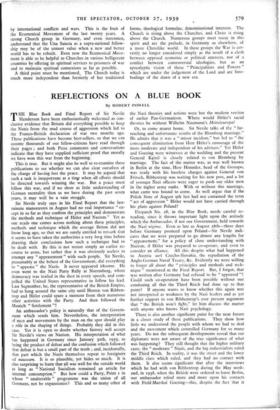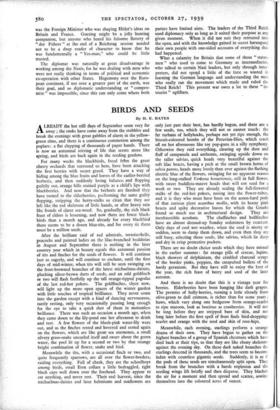REFLECTIONS ON A BLUE BOOK
By ROBERT POWELL
THE Blue Book and Final Report of Sir Nevile 1 Henderson have been enthusiastically welccmed as con- clusive evidence that Britain did everything possible to keep the Nazis from the mad course of aggression which led to the Franco-British declaration of war two months ago. These publications have become best-sellers, so that we can assume thousands of our fellow-citizens have read through their pages ; and both Press comments and conversations indicate that they have supplied sufficient proof that morally we have won this war from the beginning.
This is true. But it might also be well to re-examine these publications to see whether we can also clear ourselves of the charge of having lost the peace. It may be argued that such a task is inopportune at a tin* when all efforts should be directed towards winning the war. But a peace must follow this war, and if we show as little understanding of German mentality then as we have during the past seven years, it may well be a vain struggle.
Sir Nevile truly says in his Final Report that the last- minute manoeuvres in August had no real importance " ex- cept in so far as they confirm the principles and demonstrate the methods and technique of Hitler and Nazism." Yet as one reads one comes across nothing about these principles, methods and technique which the average Briton did not know long ago, so that we are surely entitled to remark that it seems to have taken the authorities a very long time before drawing their conclusions how such a technique had to be dealt with. By this is not meant simply an earlier re- course to arms, but rather that it was obviously useless to attempt any " appeasement " with such people. Sir Nevile, presumably at the behest of the Government, did everything to " appease " the Nazis. It never appeared irksome. He even went to the Nazi Party Rally at Nuremberg, where democracy was trailed in the dust in every speech, and com- pelled the United States representative to follow his lead. Last September, he, the representative of the British Empire, had to hang around the same city until Herren von Ribben- trop and Hitler could spare a moment from their numerous other activities with the Party. And then followed the Munich " Settlement "!
An ambassador's policy is naturally that of the Govern- ment which sends him. Nevertheless, the interpretation of men and movements by the man on the spot should play a role in the shaping of things. Probably they did in this case. Yet it is open to doubt whether history will accept Sir Nevile's views on Nazism. His interpretation of what has happened in Germany since January 3oth, 1933, as being the product of defeat and the confusion which followed that defeat is but a small part of the truth ; and, incidentally, that part which the Nazis themselves repeat to foreigners ad nauseam. It is so plausible, yet hides so much. It is also surprising to learn that all was well for the outside world as long as " National Socialism remained an article for internal consumption." But how could a Party, Point i in whose " unalterable " programme was the union of all Germans, not be expansionist? This and so many other of the Nazi theories and actions were but the modern version of earlier Pan-Germanism. Where would Hitler's racial theories be without Wilhelm Naumann's Mitteleuropa?
Or, to come nearer home. Sir Nevile talks of the " far- reaching and unfortunate results of the Blomberg marriage." He admits that it was a " minor incident," but led to " the consequent elimination from Herr Hitler's entourage of the more moderate and independent of his advisers." Yet Hitler and Goering were witnesses at the wedding and the present General Keitel is closely related to von Blomberg by marriage. The fact of the matter was, as was well known in Berlin at the time, Herr Himmler, head of the Gestapo, was ready with his baseless charges against General von Fritsch, Ribbentrop was waiting for his new post, and a lot of younger Nazi officers were eager to push out older men in the higher army ranks. With or without this marriage, what came was bound to come. As well argue that if the Polish Note of August 9th last had not contained the term " act of aggression " Hitler would not have carried through his plans against Poland!
Despatch No. 28, in the Blue Book, needs careful re- reading, since it throws important light upon the attitude which the Ambassador, if not our Government, held towards the Nazi regime. Even as late as August 28th—three days before Germany pounced upon Poland—Sir Nevile indi- cates that we were prepared to go almost any lengths for " appeasement," for a policy of close understanding with Nazism, if Hitler was prepared to co-operate, and even to consider an alliance. All this despite what had happened to Austria and Czecho-Slovakia, the repudiation of the Anglo-German Naval Treaty, &c. Evidently we were willing to forget all about the " principles and methods and tech- nique " mentioned in the Final Report. But, I forgot, that was written after Germany had refused to be " appeased "! Could such co-operation have been possible without our condoning all that the Third Reich had done up to that point? If anyone wants to know whether this again wat not interpreted as weakness by the Nazi leaders and as yet further support to von Ribbentrop's ever present argument that " the British won't fight," let him discuss the matter with anyone who knows Nazi psychology.
There is also another significant point for the near future in a closer study of these publications. They show how little we understood the people with whom we had to deal and the movement which controlled Germany for so many years. Do not the subsequent developments reveal that our diplomats were not aware of the true significance of what was happening? They still thought that the higher military caste, the " moderate " Nazis, and the big industrialists ruled the Third Reich. In reality, it was the street and the lower middle class which ruled, and they had no contact with them. It also seems significant that after the interviews which he had with von Ribbentrop during the May week- end, in 1938, when the British were ordered to leave Berlin, our ambassador relied more and more upon his contacts with Field Marshal Goering—this, despite the fact that it was the Foreign Minister who was shaping Hitler's ideas on Britain and France. Goering might be a jolly hunting companion, but anyone who heard his fulsome flattery of " der Fiihrer " at the end of a Reichstag session needed not to be a deep reader of character to know that he was fundamentally a " Yes-man," who could be little trusted.
The diplomat was naturally at great disadvantage in working among the Nazis, for he was dealing with men who were not really thinking in terms of political and economic co-operation with other States. Hegemony over the Euro- pean continent, if not over a greater part of the earth, was their goal, and so diplomatic understanding or " compro- mise " was impossible, since this can only come where both parties have limited aims. The leaders of the Third Reich used diplomacy only as long as it suited their purpose at any given moment. When it did not suit they retreated into the open, and with the knowledge gained in secret harangued their own people with one-sided accounts of everything that had happened.
What a calamity for Britain that some of those " states- men " who used to come to Germany as intermediaries. who talked to certain Nazi leaders, but only through inter- preters, did not spend a little of the time so wasted in learning the German language and understanding the men who really ran the movement which made and ruled the Third Reich! This present war owes a lot to these " in- tourist " uplifters.









































 Previous page
Previous page